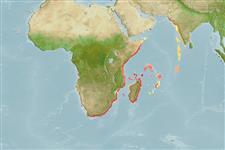Environment: milieu / climate zone / depth range / distribution range
Ecology
Marine; freshwater; brackish; demersal; catadromous (Ref. 51243). Tropical; 25°N - 35°S
Western Indian Ocean: east coast rivers of Africa from Kenya south to Cape Agulhas, also in Madagascar and other western Indian Ocean islands (Ref. 7248, 52193). Reported from New Caledonia (Ref. 11889).
Size / Weight / Age
Maturity: Lm ? range ? - ? cm
Max length : 150 cm TL male/unsexed; (Ref. 3506); 120.0 cm SL (female); max. published weight: 5.7 kg (Ref. 52193); max. published weight: 5.7 kg; max. reported age: 20 years (Ref. 48660)
Migratory species, which breeds in the ocean (Ref. 52331). Inhabits both quiet and fast flowing water (Ref. 13337). Elvers ascend rivers mainly at night and overcome waterfalls and walls of dams with great determination. Adults usually sedentary. Females can attain 120 cm SL and are generally longer and heavier than males (Ref. 48660). Carnivorous, eats dead or living prey but especially fish and crabs. After feeding in fresh water for ten years or more, adults assume a silver breeding dress, the eyes become enlarged and they return to sea to breed. Considered to breed east of Madagascar, but thought to move south of that island on its way to the Mozambique coast and South African rivers (Ref. 13337). Flesh fatty but highly esteemed as smoked or jellied eel (Ref. 5214). Caught with various types of nets (Ref. 4967).
Life cycle and mating behavior
Maturities | Reproduction | Spawnings | Egg(s) | Fecundities | Larvae
Castle, P.H.J., 1984. Anguillidae. p. 34-37. In J. Daget, J.-P. Gosse and D.F.E. Thys van den Audenaerde (eds.) Check-list of the freshwater fishes of Africa (CLOFFA). ORSTOM, Paris and MRAC, Tervuren. Vol. 1. (Ref. 3506)
IUCN Red List Status (Ref. 130435)
Threat to humans
Harmless
Human uses
Fisheries: commercial; aquaculture: commercial; gamefish: yes
Tools
Special reports
Download XML
Internet sources
Estimates based on models
Preferred temperature (Ref.
123201): 19.6 - 27.5, mean 26.4 °C (based on 98 cells).
Phylogenetic diversity index (Ref.
82804): PD
50 = 0.5000 [Uniqueness, from 0.5 = low to 2.0 = high].
Bayesian length-weight: a=0.00089 (0.00051 - 0.00156), b=3.20 (3.05 - 3.35), in cm total length, based on LWR estimates for this species & Genus-body shape (Ref.
93245).
Trophic level (Ref.
69278): 3.3 ±0.55 se; based on food items.
Generation time: 26.8 ( na - na) years. Estimated as median ln(3)/K based on 1
growth studies.
Resilience (Ref.
120179): Very Low, minimum population doubling time more than 14 years (K=0.04).
Fishing Vulnerability (Ref.
59153): Very high vulnerability (81 of 100).
